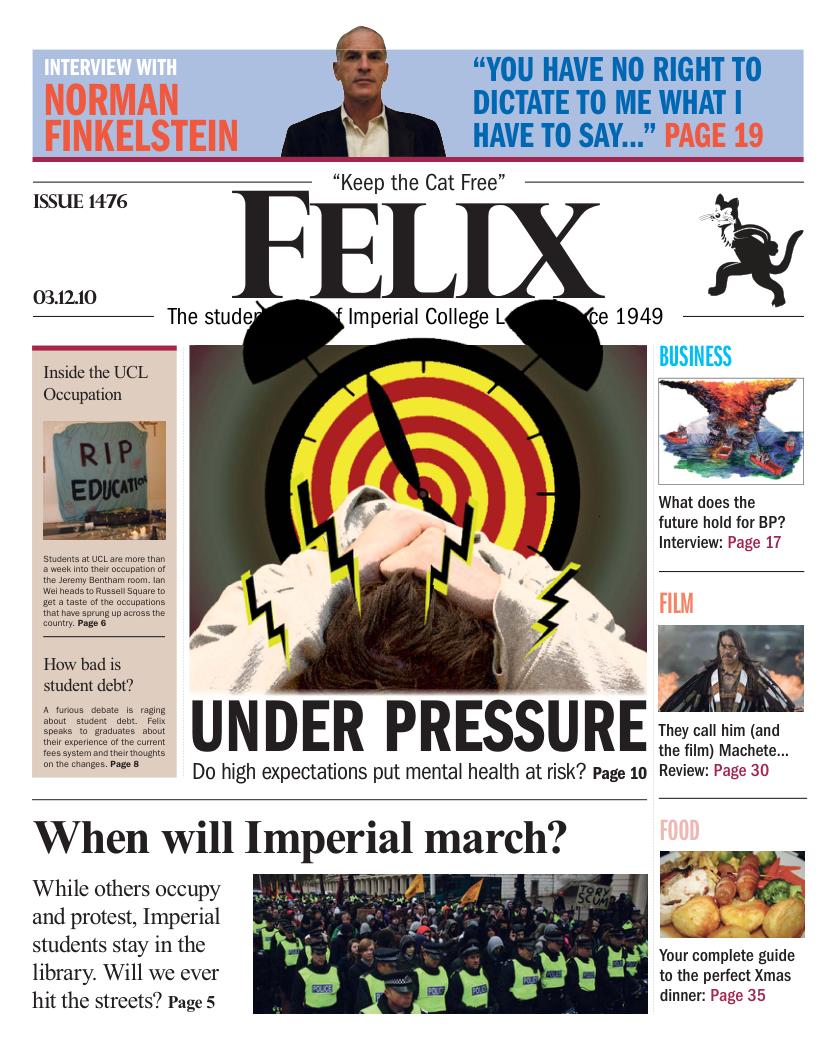Let’s be more open about mental illness
Katherine Bettany and Lizzie Crouch on the stigmas often attached to mental illness

Two o’clock in the morning. I had got home from an amazing night out and was falling asleep when I heard people running in the corridor. It was a Friday night and we were Freshers, so I thought nothing of it; I turned over and pulled the duvet tighter around me.
Literally seconds later I was woken from my doze by the sound of loud, unnatural thump accompanied by splintering wood. I sat bolt upright. Listening intently I couldn’t hear anything other the muffled sounds of people talking. Humph. I decided that I wasn’t getting up; they’d woken me up and I didn’t want to get involved if they’d broken something!
10 minutes later, I was blissfully slipping into sleep when I was woken yet again by people running down the corridor. This time I marched to the door, and violently threw open my door, ready to give whoever it was an earful. However, I was stopped in my tracks when I came face to face with paramedics sprinting along the corridor and disappearing into my friend’s room, only metres from my own. I felt sick, and very almost was; I knew immediately that something awful had happened.
I can remember stupid details from that night so vividly, the smell of the wooden doorframe I leaned against and the pyjamas I was wearing as I stood shaking in my doorway whilst each second ticked slowly by. Some agonising minutes later, I saw one of my closest friends stretchered past me. It was then I learned that he had tried to hang himself. The splintering noise from earlier was people breaking down his door, and the muffled voices were them saving his life.
I didn’t go back to sleep that night; I sat cold and shivering on the foot of my bed, with a multitude of emotions that running through me. That night was 6 years ago, as I was approaching the end of my first term at university, but it is etched into my memory forever.
My friend was lucky; he survived, and after confronting his issues is actually one of the happiest people I know today. Unfortunately, this is not an uncommon story; many people have, or know friends with, mental health issues. The Times recently reported that the University of Cambridge was reviewing its counselling provision after this term saw the highest rate of suicide at the university for over a decade. However, Cambridge has one of the best counselling services among the UK’s universities.
The Oxford Centre for Suicide Research has published papers showing that suicides rates are highest in the 18 to 21 demographic, the very demographic that makes up the majority of university students. The centre highlighted the fact that student life is a period of transition. However ready someone feels to move away from home, there are significant changes that occur. Time spent as a student is an ‘in-between period’ in life; you transition from depending on your family for many things including money to fully fledged independence. And this whole period is time-limited; you have to make the most of what you can and everything is all orientated to an end-goal, a degree and “the passport to the next stage in life.” Caught up in this world of practical, social and academic challenges, combined with the often “risky behaviour” associated with student living and the learning process, the stresses and strains that can take their toll.
The reported suicides of Cambridge students also highlights a perceived problem amongst high performing universities such as Imperial. It is therefore important to note that despite the media’s opinions, the centre found that “contrary to earlier findings and popular belief, suicide rates in Oxford and Cambridge University students do not differ from those in other young people.”
Universities across the board therefore all have a responsibility to look after the mental health of their students. But what makes some students more vulnerable than others? Is this simply random, or is it something to do with the kind of personalities universities attract? Professor Laycock, Head of Medicine Years 1 and 2, suggests that it is not, deeming our students to be ‘highly competitive’, who tend to ‘consider everything much more seriously’ than other young people.
Mental health problems within the medical school are common, although many conditions go unreported. This week, Felix spoke to Dr Mike Schachter, Senior Welfare Tutor for the medical school. He believes the problem to be widespread across the UK, and not more prevalent in Imperial. “There is no national comparison but in my own experience of a number of other [medical] schools the percentage here is similar to other places in the UK.”
Whilst Imperial might not have a medical school less mentally healthy than other medical schools in the UK, the same might not be able to be said about other colleges and universities across Britain. The type of personality universities attract might have something to do with this. The concept of personality types is a modern and often controversial one. In the 1950s, the idea of ‘Type A and Type B’ personality first emerged, and has remained in popular psychology ever since.
Type A personalities are the ‘stress junkies’ of this world. They are highly ambitious, highly competitive and often workaholics: a type of person arguably not uncommon at a university like Imperial. Type B personalities, conversely, are easy going, relaxed and unhurried – people who possibly wouldn’t cope with the intensely competitive environment Imperial creates. Type A personalities, so the theory goes, are much more likely to experience problems with mental health, as well as heart disease.
The idea of personality typography is very controversial, with much of the scientific world shunning its credibility. Many believe that the human condition is far too complex to be neatly sorted into two categories. Of course, nobody can deny that students at Imperial are highly driven, ambitious individuals. This drive to succeed will of course put added pressure on the individual, contributing to possible mental health issues.
The most important thing to remember that one mental health disorder is not the same as another. Mental health issues encompass a wide range of conditions affecting a person’s emotions and well-being. There is difference between ‘anxiety and worry about exams’, and more serious disorders such as depression (the most common psychological problem experienced by Imperial students). Perhaps the high-pressure environment that Imperial offers could cause students to feel anxious, but nobody can seriously suggest that such an environment can be a sole cause of depression (or any other mental health issue – after all the vast majority of Imperial graduates are well-adjusted, healthy individuals). Depression is a complicated illness, with many interplaying facets, including genetics and predisposing factors (possibly personality type), as well as stressors and life events. High-pressure environments may exacerbate a problem that already exists.
Mental illness is probably more common among your peers then you think, but there is still such a stigma attached to having a mental illness that people still refrain from discussing it openly. As Rethink, a mental health charity, excellently defines it, “Stigma is something judged by others as a sign of disgrace and something that sets a person apart from others.”
When something such as mental illness is stigmatised, the issues will be avoided. This silence, and unwillingness to understand the problems, often makes people feel ashamed, and sometimes prevents people from seeking help or even admitting they have a problem. It is important that people address their issues.
My friend felt he couldn’t be open and approach someone about his problems. He could pad down the corridor, duvet wrapped around him, to come and sit on the end of my bed and gossip about menial things but he couldn’t tell me about his inner demons. Overcoming the stigma of mental illness will be a challenge, but increased openness and understanding will help prevent a repeat of those events which occurred 6 years ago.








